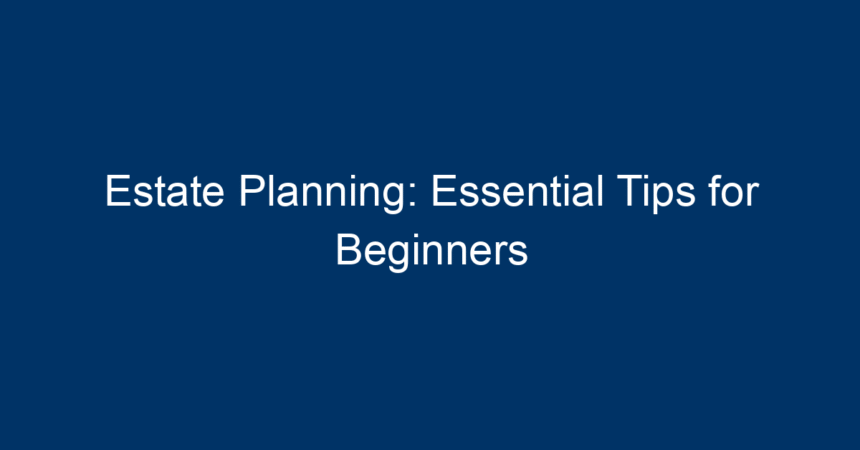Estate planning is a crucial process that everyone should consider, regardless of their age or financial status. While it may seem daunting, taking the time to plan your estate can save you, and your loved ones, a lot of time, stress, and money in the long run. This article breaks down the essential tips for beginners to help you navigate the world of estate planning effectively.
What is Estate Planning?
At its core, estate planning is the process of arranging for the management and disposal of a person’s estate during their life and after death. This typically includes drafting wills, setting up trusts, and making decisions about healthcare and guardianship. Proper estate planning ensures your wishes are honored and minimizes the burdens on your heirs.
Why You Need an Estate Plan
-
Control Over Your Assets: An estate plan lets you dictate how your assets are distributed, ensuring that your wishes are fulfilled.
-
Minimize Taxes: Strategic estate planning can help reduce the tax burden on your heirs, preserving more of your wealth for them.
-
Saves Time and Money: Without an estate plan, your estate may go through probate, a potentially lengthy and expensive legal process.
- Protecting Your Loved Ones: An estate plan can provide for minor children or dependents, ensuring their futures are secure.
Essential Tips for Effective Estate Planning
1. Assess Your Assets
Before diving into the specifics of estate planning, take stock of your assets. This includes:
- Real estate
- Bank accounts
- Investments
- Personal belongings of value
- Business interests
Once you have a comprehensive list, evaluate the total value of your estate. This assessment provides a clear foundation upon which to build your estate plan.
2. Create a Will
A will is one of the most fundamental elements of an estate plan. It outlines how your assets will be distributed after your death. When creating a will, consider the following:
-
Choose an Executor: This person will carry out the instructions in your will. Choose someone trustworthy and organized.
-
Specify Beneficiaries: Clearly state who will receive your assets, to avoid any potential disputes.
- Guardianship: If you have minor children, designate a guardian for them in your will.
3. Consider Trusts
Trusts offer flexibility and can be beneficial for certain circumstances. They can help you avoid probate, allowing for a smoother transition of assets. Types of trusts include:
-
Revocable Living Trust: Allows you to maintain control of your assets during your lifetime while dictating how they should be handled after your death.
- Irrevocable Trust: Once set up, this type of trust cannot be changed easily. It offers benefits in terms of tax savings and asset protection.
4. Plan for Healthcare Decisions
Estate planning isn’t just about finances. It’s also crucial to make provisions for healthcare decisions in case you become unable to communicate your wishes. Key components include:
-
Living Will: This document outlines your preferences for medical treatment, such as life support or resuscitation.
- Healthcare Power of Attorney: Designate someone to make medical decisions on your behalf if you are unable to do so.
5. Review Beneficiary Designations
Many financial accounts, such as retirement accounts and life insurance policies, allow you to designate beneficiaries directly. Regularly review and update these designations to ensure they align with your estate plan.
6. Understand Tax Implications
Estate taxes can significantly impact the wealth you pass on to your heirs. Consult with a tax professional to understand how estate planning affects your tax situation. Here are some strategies to consider:
-
Gift Tax Exemption: Take advantage of annual gift tax exclusions to transfer wealth to heirs during your lifetime.
- Marital Deduction: Spouses can inherit each other’s assets without facing estate tax.
7. Keep Documents Organized
Your estate plan should include important legal documents such as:
- Will
- Trust agreements
- Powers of attorney
- Healthcare directives
Store these documents in a secure, easily accessible location, and ensure your executor or power of attorney knows where to find them.
8. Communicate Your Wishes
Once you’ve established your estate plan, communicate your wishes to your family. This can prevent misunderstandings and foster harmony among your loved ones. Discuss your reasoning behind decisions, especially concerning significant assets or guardianship roles.
9. Regularly Update Your Estate Plan
Life events such as marriage, divorce, the birth of a child, or changes in financial status can require updates to your estate plan. Set a regular schedule, perhaps every three to five years, to review and revise your documents as needed.
10. Consult with Professionals
While it may be tempting to DIY your estate planning, enlisting the help of professionals can provide invaluable insight. Estate planning attorneys, financial advisors, and tax professionals can help ensure your plan is comprehensive and aligns with the law.
Actionable Insights for Beginners
-
Begin with a Simple Will: Even a basic will is better than having no plan at all. This can serve as a building block for more complex estate planning later.
-
Priority on Healthcare Directives: Make your healthcare wishes known to avoid potential family conflicts during critical times.
-
Educate Your Family: Share your estate planning decisions and rationale with your family to facilitate understanding and reduce potential disputes.
-
Stay Informed: Laws regarding estate planning can change, so staying informed can help you make necessary adjustments to your plan.
- Review Your Documents Annually: Set a reminder to review your estate plan yearly or after major life changes.
Conclusion
Estate planning is not just a task for the wealthy; it’s a crucial process for anyone who wants to ensure their wishes are respected. With proper planning, you can protect your assets, minimize taxes, and provide for your loved ones. By following these essential tips for beginners, you can lay a solid foundation for a comprehensive estate plan that will serve you and your family well in the years to come. Remember, the earlier you start your estate planning, the more peace of mind you’ll gain knowing your affairs are in order.




